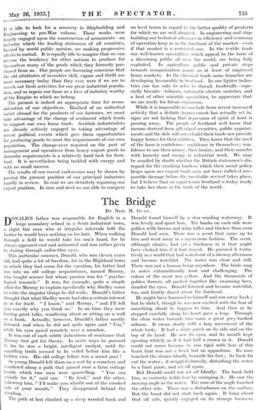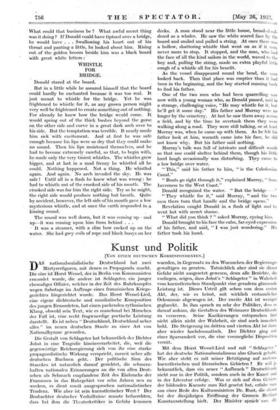The Bridge
BY NEIL
M. GUNN.
DONALD'S father was responsible for English in a large secondary school -in a Scots industrial town, a slight fair man who at irregular intervals told the barber he would have nothing on his hair. When walking through a field he would take his son's hand, for he always appeared cool and unhurried and was rather given to staring through sailor-blue eyes..
This particular summer, Donald, who was eleven years old, had quite a lot of freedom, for in the Highland town to which they had come for the vacation, his father had run into an old • college acquaintance, named Murray, who taught science but whose passion was for " psycho- logical research." It was, for example, quite a simple affair for Murray to explain specifically why Shelley came to write the singular things he did write. Donald's father thought that what Shelley wrote had also a certain interest in or for itself. -" I know," said Murray, " and I'll tell you exactly why you think so." In no time they were having great talks, -wandering about or sitting on a wall or a bank. Actually, however, Donald's father mostly listened, and when he did not quite agree said " Um," while his eyes gazed remotely over a meadow.
It was out of such subtle indications of resistance that Murray first got his theory. In acute ways he pursued it, for. he was a bright,. intelligent analyst, until the appalling truth seemed to lie veiled before him like a hidden vice. His old college fellow was a secret poet !
So young Donald left them on a scat by a cemetery and wandered along a path that passed near a farm cottage beside which two men were quarrelling. " You can whistle for it," said one. " By God," said the other, following him, "I'll make you whistle .out of the crooked side of .y.our. mouth." They disappeared behind the stead ing.., . .
The path at last climbed up a steep wooded bank and Donald found himself by a slow-winding waterway. It was lovely and quiet here. The banks on each sidc were golden with broom and whin taller and thicker than ever.. Donald had seen. There was a scent that came up to him and went away in a mysterious fashion. The scent, although elusive, had yet a thickness in it that might have choked him if it. had stayed. He pursued it tenta- tively in a world that had waked out of a drowsy afternoon and become watchful. The water was clear and still. There was not a human being anywhere. The birds sang in notes extraordinarily loud and challenging. The colour of the scent was yellow. And the thousands of golden flowers, all packed together like swarming bees, dazzled the eyes. Donald listened and became watchful, too, and faintly dazed about the forehead.
He might have hummed to himself and run away back ; but he didn't, though he was now excited with the fear of something about to happen to him. And then as he stepped carefully along his heart gave a leap. Through the clear water towards him came a great grey-backed salmon. It swain slowly with a lazy movement of the whole body. It had a white patch on its side and on the top of its head. He saw its eyes, and its mouth kept opening whitely as if it had half a crown in it. Donald could not move because he was rigid with fear of this beast that was not a beast but an apparition. Its nose touched the stones blindly beneath his feet ; its back fin cut the water ; it wriggled clumsily, disturbing the water to a faint panic, and set off again. • But Donald could not set off blindly. The bank held him, as curiosity holds fear by cramping it. He saw the moving angle in the water. The nose of the angle touched the- other side. There was a disturbance on the. surface. But the beast did not start back again. It hung about that off side, quietly engaged on its strange business. What could that business be ? What awful secret thing was it doing ? If Donald could have tiptoed over a bridge; he would have . . . Swallowing his heart out of his throat and panting a little, he looked about him. Rising out of the golden broom beside him was a black board with great white letters : • WHISTLE. FOR BRIDGE. - Donald stared at the board.
. But in a little while he assured himself that the board could hardly be enchanted because it was too real. It just meant to whistle for the bridge. Yet- he was frightened to whistle for it, as any grown person might very well be frightened to create something out of nothing. For already he knew how the bridge would come. It would spring out of the thick bushes beyond the gorse. on the other side and curve in a great dark arch over to his side. But the temptation.was terrible. It nearly made him sick with excitement. And at first he was safe enough because his lips were so dry that they could make no sound. Then his lips moistened themselves, and he had to become extremely careful, so that, to begin with, he made only the very tiniest whistles. The whistles grew . - bigger, and at last in a mad frenzy he whistled all he could. Nothing happened. Not a thing. He whistled again. And again. No arch invaded the sky. He was safe ! Until all in a flash he knew what was wrong : he had to whistle out of the crooked side of his mouth. The crooked side was for him the right side. Try as he might, the right side would produce nothing but breath. Quite by accident, however, the left side of his mouth gave a low mysterious whistle, and at once the earth'responded in .a hissing sound.
The sound was well down, but it was coming up—and up—it was coming upon him from behind . . .
It was a steamer, with a slim bow cocked up on the water. She had grey coils of rope• and black buoys on her decks. A man stood near the little house, broad-shoul- dered as a whaler. He saw the white scared face by the board and smiled and pulled a string. At once there was a hollow, shattering whistle that went on as if it were never more to stop. It stopped, and the man, who had the face of all the kind sailors in the world, waved to the boy and, pulling the string, made an extra playful little cough of a whistle all for, his benefit.
As the vessel disappeared round the bend, the man looked back. Then that place was emptier than it had been in the beginning, and the boy started running back to find his father: One of the two men who had been quarrelling was now with a young woman who, as Donald passed, said in- a strange, challenging voice, "He may whistle for it, but he'll get it some day." His father and Murray were no longer by the cemetery. At last he saw them away across a field, and by the time he overtook them they were walking along a. road.' They were still talking, or at least Murray was, when he came up with them. As he felt his father look at -him, warmth came into his face, he did not know why. But his father said nothing.
Murray's talk was full of intricate and difficult words so that one could shelter behind them, though his little hard laugh occasionally was disturbing. They came to a low bridge over water.
" This," said his father to him, " is the Caledonian Canal."
" Boats go right through it," explained Murray, " from Inverness to the West Coast."
Donald recognized the water. " But the bridge —" " They whistle for it," said Murray, " and the two men there turn that handle and the bridge opens." Revelation caught Donald in a flash of light and he went hot with secret shame.
" What did you think ? " asked Murray, eyeing him.
Donald brought to his face the calm, far-eyed expression of his father, and said, " I was just wondering." His father took his hand.

















































 Previous page
Previous page